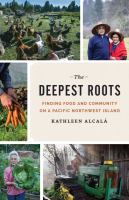The Deepest Roots: Finding Food and Community on a Pacific Northwest Island by Kathleen Alcalá
Sustainability. Buy local. Support local farmers. All are mantras of the Pacific Northwest. But how would our community fare in the case of food shortages caused by disaster or as the result of environmental degradation? Would we be able to produce enough food to feed ourselves?
Spurred by personal health concerns and with these questions asking to be explored, writer and longtime Bainbridge Island resident Kathleen Alcalá began interviewing friends actively involved in food production.
She probed these questions with farmers and foragers, chefs and restaurant suppliers, immigrant farmworkers and Suquamish elders. Six years in the making, the result is a meditation on the relationship between food, community and the environment that explores eating as an act that is agricultural, economic, political, social and spiritual.
Reading the products of this research in her new book, The Deepest Roots: Finding Food and Community on a Pacific Northwest Island, feels like getting to walk, talk, pick, poke, cook, forage and preserve right alongside Alcalá. It is a layered experience of discovery, moving organically between personal stories, cultural history, and discussions of environmental policy.
Unifying the narrative is a section at the end of each chapter entitled Haleets, the Coast Salish name for an ancient petroglyph-inscribed boulder that sits offshore Bainbridge Island and may have been a boundary marker or served a calendrical function for indigenous peoples. Alcalá invokes the long-view perspective of Haleets and the lifecycle of salmon that are so intrinsic to our environment to reflect on what has occurred on the land since the carvings were made.
Bainbridge Island is a perfect microcosm through which to explore the question of local sustainability. The community enjoys resources of wealth, education and natural abundance. There is strong local interest in food and a rich farming history. Even so, if supplies were cut off to the flagship Town & Country Market, the island would be out of food in a day.
It is a pleasant surprise to hear from some Whatcom County locals among Alcalá’s interviews. Rick Pedersen, who grew up in Ferndale and is now the store director at Town & Country, describes how decisions are made about what is purchased locally and what from factory organic sources. Rosalinda Guillen, executive director of Bellingham’s Community to Community food justice organization, also makes an appearance in a discussion about farmworkers’ rights and working conditions at Sakuma Brothers farms in Burlington. (The Sakumas were one of the families removed from Bainbridge Island and sent to internment camps during World War II; after their release, they settled in Burlington and resumed berry farming.)
All are welcome to learn more about the struggle of these local farmworkers for a just food system and their historic decision to form Familias Unidas por la Justicia—an independent farmworker union representing more than 500 Triqui, Mixteco, and Spanish-speaking workers at Sakuma Brothers Berry Farm—at “An Evening of Thanks, Honor, and Action” taking place from 6-8pm Sat., Jan. 14 at the downtown Food Co-op Connections Building.
The perspective presented in The Deepest Roots believes the land can tell us what it needs and entire generations of people lived on the land harmoniously and without destroying it by listening to it. Can we become those types of people? Taking all of these stories together begins to paint a picture of what needs to happen for us to inhabit that future.
Lisa Gresham is the Collection Support Manager for Whatcom County Library System, where she selects adult nonfiction titles for the collection.
(Originally published in Cascadia Weekly, Wednesday, January 11, 2017)

